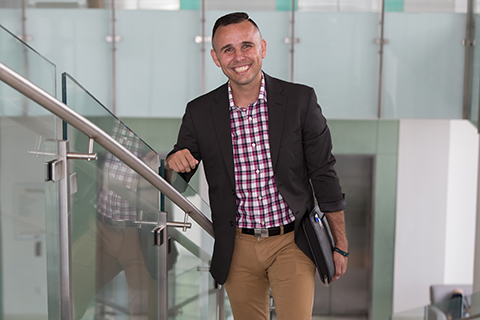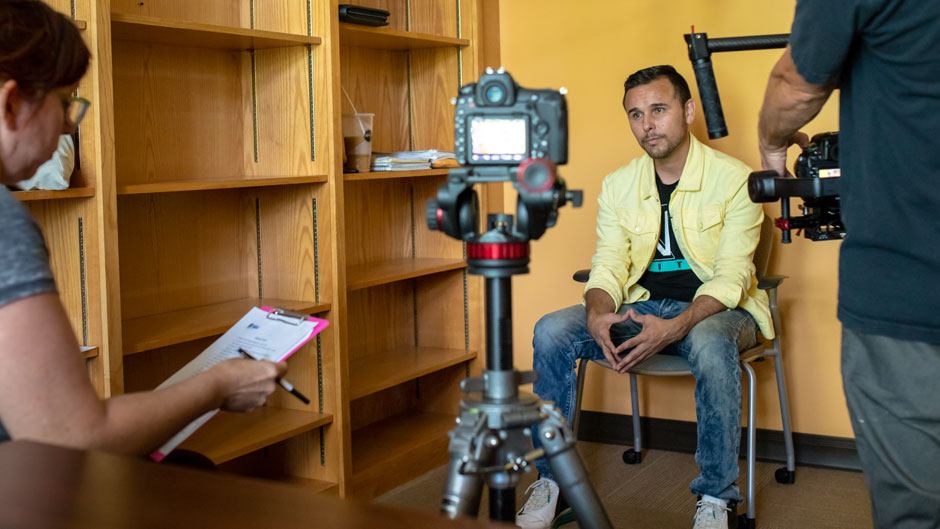Angel Sanchez had no time for lunch, much less another interview. The second-year student in the University of Miami School of Law already had so much on tap, including writing an essay on prison for the Harvard Law Review and teaching a high school law class, that he was skipping his own classes and duties at Miami Law’s Innocence Clinic.
Yet the 36-year-old who was sentenced to 30 years in prison for attempted murder at age 16 spared a precious hour last week to tape public service announcements supporting Amendment 4 on Florida’s mid-term election ballot. Touted as the “Second Chances” amendment, the measure would restore the right to vote to most of the more than 1.4 million Florida citizens who, despite completing all terms of their sentences, permanently lost theirs when they were convicted of a felony. The only exception would be people convicted of murder or felony sexual offenses.
Now in the top 5 percent of his class, Sanchez knows as much about second chances as he does about what he calls the “post-Civil War/Jim Crow-era law” that not only bars him from voting in Florida, but probably practicing law. Which is why the former gang member who became a homeless honor student, scholarship recipient, college graduate, motivational speaker, and social justice advocate is one of the most sought-after spokespeople for the grassroots campaign that collected the nearly 800,000 verified signatures needed to put Amendment 4 on the ballot.
“Angel is the perfect example of what happens when you invest in people, when you believe in people, when you give them the tools, the education, the support and, most of all, the second chance they need,” said Raymer Maguire, manager of the American Civil Liberties Union of Florida’s Campaign for Criminal Justice Reform.“I get chills when I hear him speak, and I get inspired by his extraordinary story. But many other people could be just as extraordinary, if only given a second chance. Angel is certainly special, but what may be more special is the fact that so many people have given him a chance.”
ACLU spot featuring Angel Sanchez.
Born in Miami’s inner city to an absent mother who battled drug addiction, Sanchez was raised by his Cuban father, a tow-truck driver who schooled his son on the value of education. But, like a lot of adolescents, he chose friends over family and, by middle school, was roving the streets with a .38 special and fellow gang members, who violently tangled with drug dealers and rivals. By 13 he had a rap sheet; at 16 he was sentenced as an adult to 30 years in prison, where he “grew up, both mentally and spiritually.”
The day he earned his GED behind bars—slipped under the door of his solitary confinement cell—he started to believe his father was right. If he worked hard and got an education, he could still do great things. The day he was assigned to work in the prison law library, with not a single guard watching over him, was the first time in his life he felt trusted. Education became a burning passion. Almost single-handedly, he wrote legal appeals that would reduce his sentence to 15 years. Then he set his sights on law school.
“That’s part of the reason I got on the right track,” Sanchez said. “I felt empowered and passionate about what I was doing. So with education complementing my growth I matured from a 16-year-old kid who had 20 disciplinary reports my first six years in prison to zero my last six years.”
In 2011, Sanchez was released from prison after serving 12 years. Instead of returning to Miami, he headed to Orlando to attend Valencia Community College, the only institution that responded to his prison inquiries. “Come see us when you get out,” someone had scrawled on a note.
The new student moved into an Orlando homeless shelter, where he encountered his first roadblock: He would not be allowed to live there unless he had a full-time job. But an assistant manager relaxed the rule, allowing Sanchez to attend school with just a part-time job. Riding four buses a day, he worked in Valencia’s financial aid office and, in 2014, graduated with two associate degrees and as the college’s commencement speaker and most distinguished graduate.
He also earned a full scholarship to finish his education from the Jack Kent Cooke Foundation, which supports “exceptionally promising students” who have financial needs. But the University of Central Florida, where Sanchez planned to transfer, would not accept him or his scholarship until he had served half of his 10-year probationary period.
With only three years under his belt, Sanchez returned to Miami to ask his sentencing judge to cut his probation in half. Impressed with his turnaround, the judge terminated his probation altogether, and later offered him a summer internship. The following summer, one of her judicial colleagues did the same, not only giving Sanchez a job, but a place to live with his family.
“I rarely hire clerks who are not already in law school because they don’t know how to do legal writing…or legal research,” Miami-Dade Circuit Judge Miguel De la O told the Orlando Sentinel at the time. “But Angel, because of working on his own case, and working in a law library at prison, was an excellent clerk.”
Sanchez would not disappoint. In 2017, he graduated from UCF with top honors, after helping collect more than 300 books for the Orange County Jail’s law library, and becoming one of the top moot-court competitors in the U.S.
“He had to work harder than anyone else to get where he is,” Alisa Smith, the chair of UCF’s legal studies department told the Sentinel. “He has defied the odds every step of the way.”
 Today, Sanchez, who the Cooke foundation continues to support, is working harder than ever because of who he is. While carrying a full class load, working in Miami Law’s Innocence Clinic and teaching law to high schoolers and literacy to inmates, he continues to advocate for one of the issues dearest to his heart.
Today, Sanchez, who the Cooke foundation continues to support, is working harder than ever because of who he is. While carrying a full class load, working in Miami Law’s Innocence Clinic and teaching law to high schoolers and literacy to inmates, he continues to advocate for one of the issues dearest to his heart.
A leader for the grassroots campaign spearheaded by the Florida Restoration Rights Coalition, he frequently recounts his own story and countless reasons why Florida should join most other states in automatically restoring the voting rights of people who have, according to the criminal justice system that punished them, repaid their debts to society.
In just the last few weeks, he’s appeared on legal panels and at community forums, on National Public Radio, in a short documentary by superstar John Legend's nonprofit dedicated to criminal justice reform, and, on this day, in an empty office outside UM’s law library, to tape the PSAs which Florida’s ACLU plans to air before Floridians decide whether, as Sanchez puts it, his right to vote should be decided by “the rule of law or the will and whim of politicians and the election cycle.’’
One of only four states to impose a lifetime voting ban on former felons, Florida does have a process for restoring their voting rights. But the decision rests entirely with the governor and three-member Florida Cabinet, who sitting as the clemency board, meet four times a year.
Speaking at one of those meetings, Governor Rick Scott acknowledged that the board has no guidelines for turning down applicants, which it usually does. During Scott’s nearly eight years in office, he has restored the voting rights of just over 3,000 former felons—a far cry from the 155,000 felons former Governor Charlie Christ restored during his four years in office, after adopting a policy of re-enfranchising non-violent offenders who had completed their sentences, including restitution.
Scott also made it harder for former felons to even apply for clemency, requiring them to wait for up to seven years before they can file a petition. “This is a court of mercy,” Scott explained at one clemency board meeting. “There’s absolutely no standards, so we can make any decision we want.”
To Sanchez, that makes Florida an embarrassing outlier. As he notes, a quarter of the 6 million Americans who cannot vote because of their felony records are in Florida, making the Sunshine State the disenfranchisement capital of both the nation, and the rest of the industrialized world, where the debate is strikingly different.
“The debate in industrialized, democratic nations hasn’t been whether their citizens who have finished their sentences can vote. That’s unquestionable,” said Sanchez, who having just completed his seven-year waiting period would have to get in line behind 10,000 other applicants to apply for clemency. “The debate is whether their citizens can vote while they are in prison.”
Two states, Vermont and Maine, also allow their prisoners the right to vote—as do all other industrialized, western democracies.
Florida’s proposed constitutional amendment doesn’t go that far, but Sanchez believes most Floridians agree that, at the very least, former felons who have not only paid their debt but are living, working, and paying taxes in our communities have earned a second chance and that society—and the economy—will benefit from their inclusion as full-fledged citizens. It is, after all, a non-partisan argument embraced not only by the ACLU but the likes of the Christian Coalition and the conservative Freedom Partners Chamber of Commerce, funded by the Koch brothers.
“When people say, ‘Angel you are the exception,’ I like to say, ‘I am the exception because of the exceptional opportunities I was given,’ ’’ Sanchez said. “Not because of anything different about me, but because there were people along my journey who helped remove barriers in my way. Now Floridians have a chance to do the same—to remove a huge barrier for people who are their neighbors, their friends, their loved ones, and strangers from all walks of life—who shouldn’t remain second-class citizens.”

